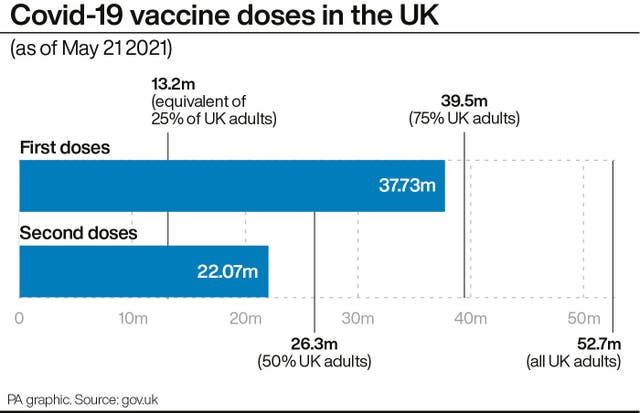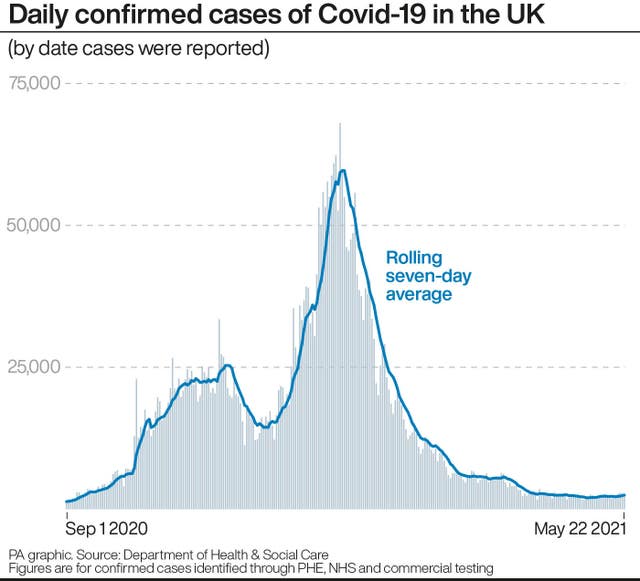Vaccines ‘offer high levels of protection against Indian variant’
Both the Pfizer and AstraZeneca jabs were found to be highly effective against the B1617.2 strain.

The Pfizer coronavirus vaccine is 88% effective against the Indian variant after two doses, a study by Public Health England (PHE) has found.
Both the Pfizer and AstraZeneca jabs were found to be almost as effective against symptomatic disease from the B1617.2 strain as they are against the Kent variant after the second dose.
However, they were only 33% effective three weeks after the first dose.
Health Secretary Matt Hancock described the outcome as “groundbreaking”, while PHE said it expects to see even higher levels of effectiveness against hospital admission and death.
The study, which took place between April 5 and May 16, found that the Pfizer vaccine was 88% effective against symptomatic disease from the Indian variant two weeks after the second dose, compared with 93% effectiveness against the Kent strain.
Meanwhile, the AstraZeneca jab was 60% effective, compared with 66% against the Kent variant over the same period.
Both vaccines were 33% effective against symptomatic disease from the Indian variant three weeks after the first dose, compared with about 50% against the Kent strain.
Some 12,675 genome-sequenced cases were included in the analysis, but only 1,054 were of the Indian variant.
The study included data for all age groups from April 5 to cover the period since the strain emerged.

New data from PHE shows there have been at least 2,889 cases of the Indian variant recorded in England from February 1 this year to May 18.
Of those, 104 cases resulted in a visit to a hospital emergency department, 31 required an overnight hospital admission and six resulted in a death.
The most common strain in England, according to the data, is the Kent variant, with 132,082 cases recorded over the same period.
Some 1,569 people have died with the variant, while 2,011 cases resulted in an overnight hospital admission and 5,238 required a visit to a hospital emergency department.
Dr Jamie Lopez Bernal, consultant medical epidemiologist at PHE and the study’s lead author, said there was more confidence in the data from the first vaccine dose compared with that from the second.
He told journalists on Saturday: “There are bigger numbers that have been vaccinated with one dose. So I think we classify that as moderate certainty around the first dose, but low levels of confidence around the second dose.”
However, Professor Susan Hopkins, PHE’s Covid-19 strategic response director, said the data trend was “quite clear” and was heading in the “right direction”.
PHE said the difference in the effectiveness between the vaccines may be due to the AstraZeneca second dose being rolled out later than the Pfizer vaccine.
Data also shows it takes longer for the AstraZeneca jab to reach maximum effectiveness.
There are insufficient cases and follow-up periods to estimate vaccine effectiveness against severe outcomes from the Indian variant but this will be evaluated over the coming weeks, PHE added.
Asked about how the data could affect the easing of restrictions from June 21, Prof Hopkins said it was “too early to say”.
She said: “One week post the last restriction lifting, we will be monitoring it very carefully.”

Mr Hancock said: “This new evidence is groundbreaking and proves just how valuable our Covid-19 vaccination programme is in protecting the people we love.
“We can now be confident that over 20 million people – more than one in three – have significant protection against this new variant, and that number is growing by the hundreds of thousands every single day as more and more people get that vital second dose.”
Dr Mary Ramsay, head of immunisation at PHE, added: “This study provides reassurance that two doses of either vaccine offer high levels of protection against symptomatic disease from the B1617.2 variant.
“We expect the vaccines to be even more effective at preventing hospitalisation and death, so it is vital to get both doses to gain maximum protection against all existing and emerging variants.”
Responding to the findings, Professor Adam Finn, professor of paediatrics at the University of Bristol said: “Overall the results are encouraging in that the vaccines are continuing to provide useful protection.
“However, protection after the first dose appears to be reduced to a potentially important degree.”
Separate analysis by PHE indicates that the vaccination programme has so far prevented 13,000 deaths and about 39,100 hospital admissions in older people in England, up to May 9.
Meanwhile, Downing Street said it was looking at ways to publish data on cases transmitted in different settings in a “robust and clear way”.
It comes after the Observer reported that data on the spread of the Indian variant in schools had been due to be published this week, but was not included in a PHE report on Thursday.
A Downing Street spokesman said: “Twice a week Public Health England publish a breakdown of the number of cases of each variant in the UK.
“Given public interest in variants of concern, we are looking at ways to publish cases transmitted in different settings in a robust and clear way. PHE will publish this data in due course.”
Latest figures show that more than 50 million doses of coronavirus vaccine have now been given in England.
A total of 50,246,402 Covid-19 vaccinations took place between December 8 and May 21, according to NHS England data, including first and second doses.





